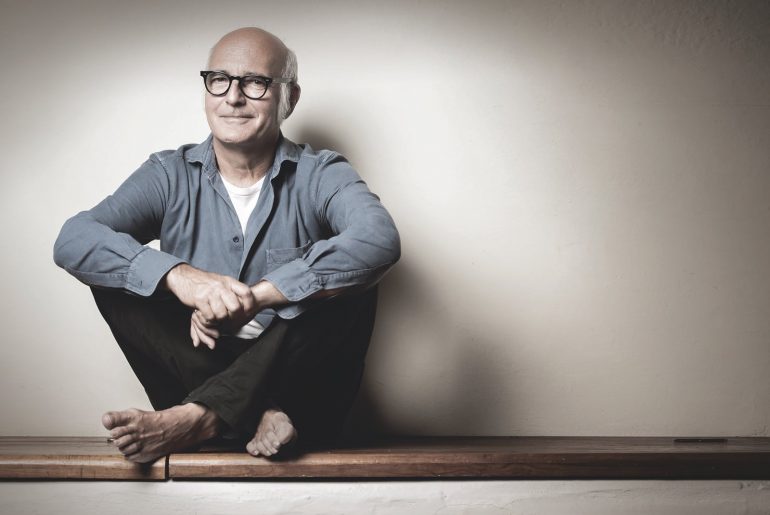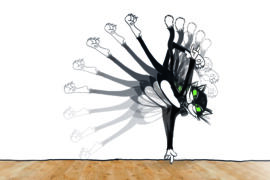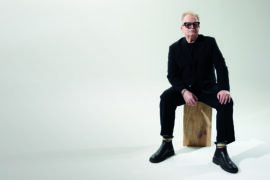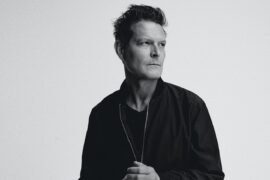An interview with the Italian composer
The Italian pianist and composer, Ludovico Einaudi (66), is the most streamed classic artist of all time. He fills auditoria and temples of pop with his music, which is partly of a meditative to lounge nature. ADAM THE MAGAZINE talked to him about the origins of his new album «Underwater».
Your music has a healing effect on our pandemic-troubled souls. We should be able to get «Underwater» on prescription …
Yes … (smiles), put it this way: there is an actual connection between this music and the situation we find ourselves in. The first pieces were written two years ago. I had just come back from giving concerts in Australia and Singapore, when the first signs of COVID-19 appeared in China, but no one thought yet that this virus could also come to us. Then it exploded here in northern Italy as well and the lockdown came. I actually only wanted to spend a week in our house in the mountains, but then the week turned into several months.
How did you spend this time?
It was as if all activities in the world had been stopped. I had never experienced this before, nobody had ever experienced it. If we factor out all the suffering, which many people experienced, the sudden tranquility and silence had a positive effect as well. There were almost no airplanes in the sky, air pollution was reduced and the fish returned to the lagoon in Venice. It was as if nature wanted to tell us to take everything a bit easier and not to stress the planet as much.
And did you obey?
During those days on which I had no responsibilities I began to sense the freedom and felt almost like a teenager, living one day at a time and only doing what I loved. I went for walks, then sat down at the piano, composed, recorded pieces … Everything ran smoothly, without pressure, without a defined objective. I actually did not want to make a new album.
But then?
I was doing everything out of pleasure and delight because I had unrestricted time. As no one knew when the pandemic would end I had the feeling of infinity. I began to write down several ideas on paper. I became particularly fond of the pieces because this music came to me without me having to look for it. Then I noticed that I wanted to share it with others.
«Underwater» is your first solo piano album in 20 years…
Yes, however I did not realize that in the beginning, as other albums include individual solo piano pieces. I love returning to this pure form, to the dialogue between pianist and instrument, which is both giving and taking. You influence the piano with your breathing and movement, the piano answers with the sound, which leads again to the pianist’s breathing. It is almost like playing the didgeridoo! (laughs)
What was the inspiration for the album title?
«Underwater» is synonymous with the sound that is not present in our everyday lives, in which the world pulsates and moves, but from a sphere in which everything is more round and muted. Under water you hear your own breathing, your pulse, and you perceive yourself differently.
What does the swan on the cover symbolize?
In ancient Greece it was a symbol for beauty and grace. Apollo, the God of poetry and music, considered the swan to be sacred. The swan also stands for depth and reminds you to follow your instinct – the flow of life.
Is it true that you took the photo yourself?
Yes, since I was 14 years-old photography, in particular with films, has been a great passion of mine. I have a small camera collection and love to take photos when I’m out walking or on tour. My concerts often begin with projections of pictures that I have taken.
How do your compositions develop?
The initial ideas come from improvisations, from an irrational rhapsodic impulse. Then I play the individual parts again and again, revise them, and sometimes write the notes by hand in my exercise books. The repetitive process slowly shapes the form of the pieces, until I am happy with them. After this first phase of stabilization other variations may appear when performing in front of an audience, which change the composition only for the evening or permanently. Interestingly, I never know when recording an album which pieces I will like to play most in the long run and which will be more popular. It varies extremely.
How would you describe your music philosophy?
I like it at concerts, also my own, when there is a certain detachment from the original recordings and an unenforced intensity. As if the music is playing by itself and is being driven by a constant energy. To be able to express all emotions that are important to me, joy, strength, melancholy and sorrow, I have to be able to immerse myself in the music and find inner peace, which I do not always manage.
Your music also inspires because you allow a lot of space for personal thoughts. What effect does it have, when you hear your recordings yourself?
I recognize the strengths and weaknesses immediately and think about whether I was able to express what I wanted.
I identify with the sound and sense whether this sound is speaking and conveying its full potential to the public. Of course, everyone is free to hear what they want to hear, but it is important to me that it is coherent.
What does it mean to you to be the most streamed, classical musician of all time?
I do not think about figures too much. However, the fact that an increasing number of people are listening to my music is an additional motivation to consistently improve my work and only to do it with complete conviction. The success does not change any part of my passion, objectives that I follow or the evaluation of my work. I am extremely critical of my own work and do not settle for anything but the best.
Ludovico Einaudi was born on 23 November, 1955 in Turin into an influential family. One grandfather was the Italian President, the other a composer and conductor, his father a publisher. Ludovico learned to play the piano at an early age, went to the conservatory and then began to write stage and film soundtracks and to present minimalistic solo piano programs, inspired by Philip Glass and Erik Satie. His most famous sound track is the music of the blockbuster «Intouchables». His current album «Underwater» (Universal Music) contains twelve meditative piano instrumental pieces.
Photos Copyrights: Ray Tarantino / Universal Music





